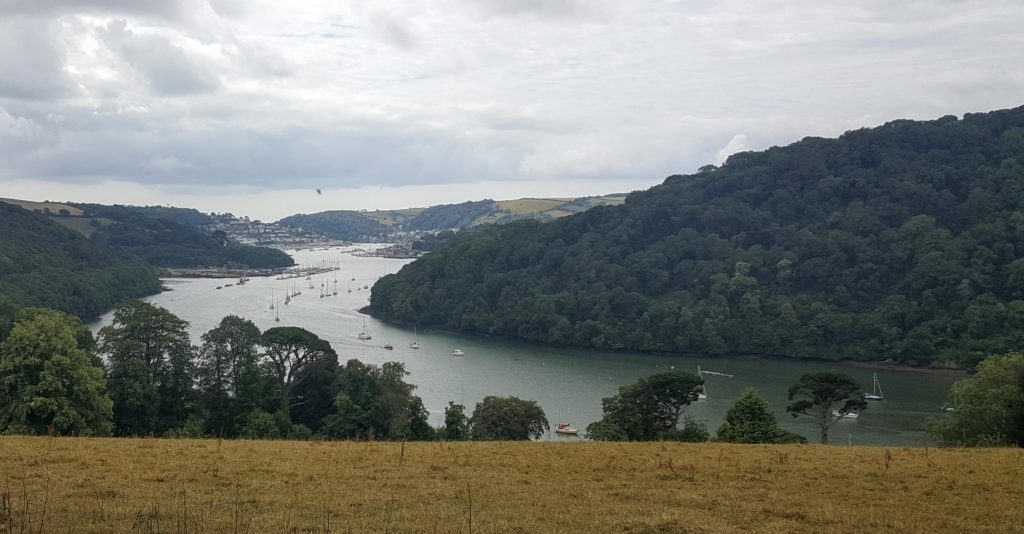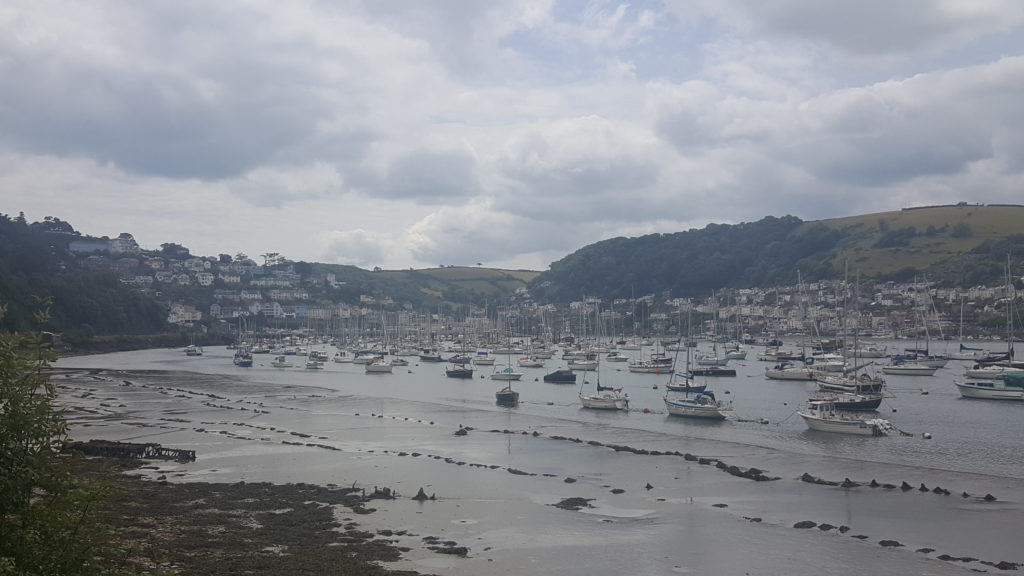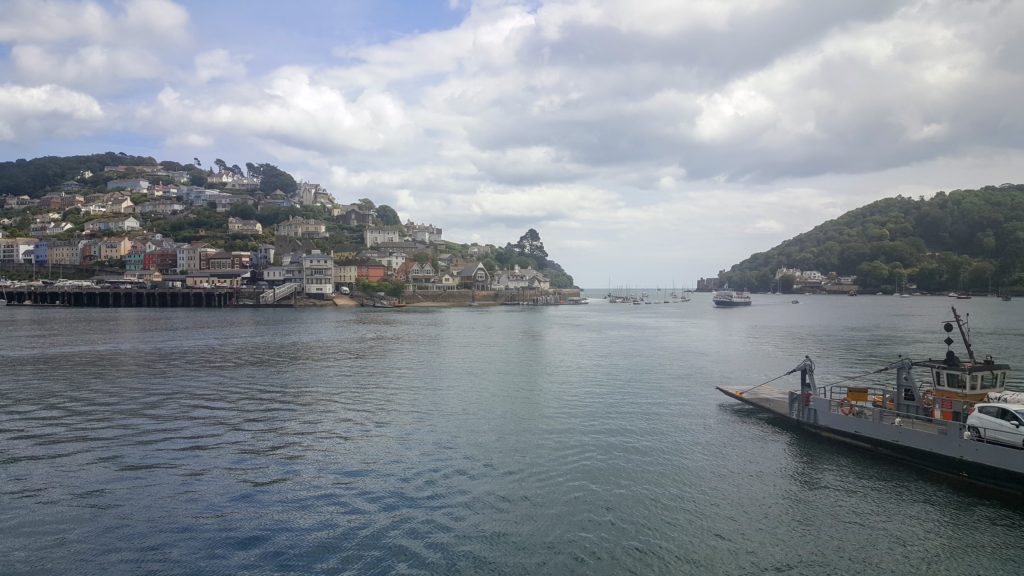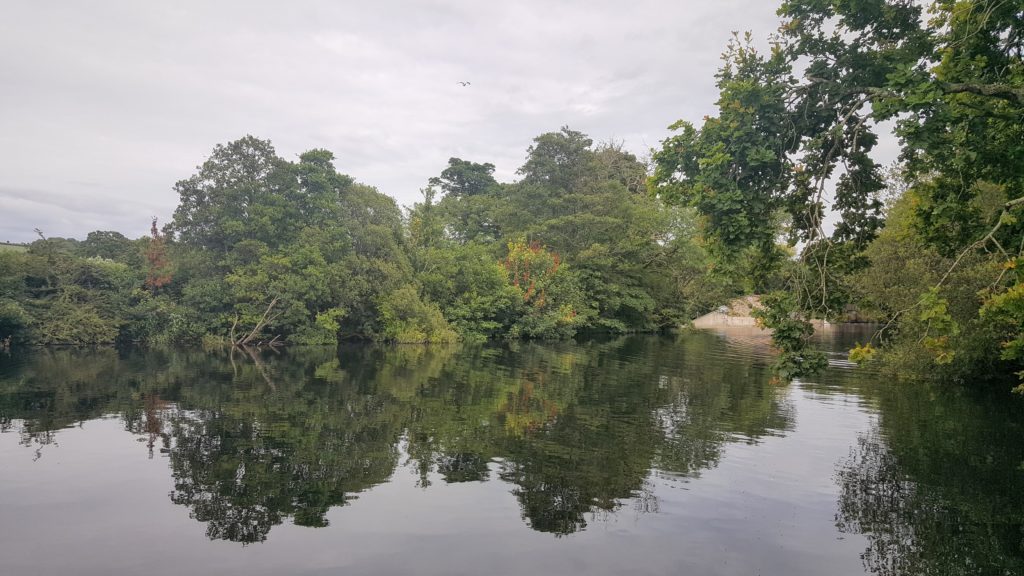Despite the dangers posed by roads, basking adders and falling pinecones, Katherine Venn completes the last leg of her Alice Oswald-inspired walk along the course of the River Dart.
It’s my last day walking the Dart: and in fact it’ll only take me the morning to get to Dartmouth. I could have finished the walk yesterday, given I covered more than a few extra miles last night, but what would have been the point in rushing? I walk down the narrow steepening lane to the quay where a little ferry – just a small boat with an outboard motor – chugs us across the channel to Greenway, where Agatha Christie had a holiday home. Looking across I can see a gorgeous cottage on the bank, peeking out from woodland: naively I assume that this is Greenway House itself, but of course it’s just the former ferryman’s cottage. I’d be happy enough living somewhere like that.

It’s all now a National Trust site and I’m more interested in the outside of people’s homes – their gardens – than the insides, even writers’; but I don’t have time to stop and explore anyway, if I’m going to get the boat back up to Totnes this afternoon. So I follow the eastern stretch of the Dart Valley Trail, skirting the edge of the old Christie property, fields and oak woods. It’s warm and damp, last night’s rain making things humid under a thick comforter of clouds. Like the flies landing on me, then flicking themselves off before landing again, I keep having to take my jumper off, then put it on again when the wind picks up. The wind in the tall trees at the top of a hill is somehow a sound I associate intimately and indelibly with childhood. And like the flies, and the temperature, I’m in two minds – two feelings? – about getting to Dartmouth, so close now. Counterbalancing the satisfaction, the sheer pleasure, of having completed it is the fact that I’ll soon be leaving all this behind, flies and all. Do I want to get to the end, or keep walking? I want both.

why is this flickering water
with its blinks and side-long looks
with its language of oaks
and clicking of its slatey brooks
why is this river not ever
able to leave until it’s over?
On the way to Long Wood I pass a series of increasingly comedic warnings. First a discreet wooden post advises me to be careful of traffic ahead: I’ll be crossing a road. On its reverse, however, I’m slightly alarmed to see that it warns walkers coming from the other direction to take care of adders basking. I might have wanted a matching sign from the direction I’ve just come. Further on a large plastic sign screams at me to be careful of ‘DANGEROUS’ falling pine cones.
By midday I’ve reached Long Wood unscathed by all three hazards. I’m walking close to the railway line – another steam railway, from Paignton this time – and I can just glimpse the Dart through the trees. The woods are cool and sharp; I try to identify some bright yellow flowers, but they’re not celandines and that’s about as far as my my slim botanical knowledge of woodland goes. I meet a couple of dog walkers, but the wood is alive with twigs crackling, so that I’m always thinking someone’s approaching.

The last stretch is right next to the railway line and feels somehow perilous, exposed. And the Dart feels foreign: wide of course, and anonymous somehow, studded with yachts all the way over to Dartmouth, with its hills and villas up behind. Finally I get to Kingswear, opposite Dartmouth proper. The sea’s round the corner, but here I am: journey’s end. I don’t know how to feel. I find a pub for lunch, where I’m served by a poor lad suffering a fierce hangover. I sit outside, under the tower of the church, and gaze over the Dart. Would you properly call it an estuary rather than a river, here?
Dartmouth and Kingsweir –
two worlds, like two foxes in a wood,
and each one can hear the wind-fractured
closeness of the other.(‘ferryman’)

A little ferry takes me over to Dartmouth, where I only have an hour or so before the last boat that’ll take me back up to Totnes where I’m staying again tonight. I can’t afford to miss it: it’s the simplest way back. And I want to stay on the river as long as I can. But I want to see the sea, too. I’d half thought I’d be able to swim here, but no chance: it’s all marina, and it’d be a drive, or a long walk, to the closest beach. I don’t even have enough time to get to the castle, or Blackstone Point, which would have been a good second-best to a swim. Instead I just walk as far as I can up towards the castle before the last possible point when I have to turn back, to ice cream and the boat. The sun finally comes out and there’s a holiday feel, the promenade full of people, eating fish and chips and ice cream like me.

It’s disconcerting how quickly we get back to Totnes, seeing the route I’ve walked the last day and a half wound back up. I just sit and look, and listen to the pilot’s comments on landmarks as we go. Dartmoor seems an age ago, even though it’s only a matter of days. It feels odd not to be walking. I wish the route had been twice as long, although I know the weather – sunny the whole way, until today – is going to break tomorrow.
I feel mournful as I get off at Totnes. But my cousin Sarah and her girls are there to meet me, and we mess about at the pirate-ship playground for a bit before heading back home with enough time for Sarah and me to cycle up the Dart a little way and have an early-evening swim. It’s overcast again and threatening to rain, but I’m glad to be ending the day like this. The water’s cold and silky-smooth.
As I drift and glide I try to spool back along all the places I’ve walked through, the length of the river, its flow from Dartmoor to here and on down to the sea. What volume of water flows down it each day? How long does it take the river itself to travel the journey I’ve just made? I think of the river’s many voices, human and otherwise, and all the people I’ve met on the way: I did it by myself, but not on my own, not really. Nothing is ever done alone. All the people who made and served me food and pints and that cream tea. The people running the pubs I stayed at. My cousin Sarah and her family, of course, who I’m back with now. Emma, who gave me her shoes; Emily, who got my new ones to me. The brothers, the gardeners at Buckfast Abbey. The people I met: Debbie and Ken and Helen, and all the other dog walkers and passers by who I shared a hello or a nod with. And I walked with, of course, the original gift, the fundamental company of the land and everything in it: river and rocks, trees, insects, birds, sheep, that moonlit pony. My memory of it all unfurls like a ribbon behind me, blending into one long hot day, the sharp particularity of those first few days on Dartmoor already fading. And of course I walked the river with Alice Oswald, via her words –
… who’s this moving in the dark? Me.
This is me, anonymous, water’s soliloquy,all names, all voices, Slip-Shape, this is Proteus,
whoever that is, the shepherd of the seals,
driving my many selves from cave to cave …
